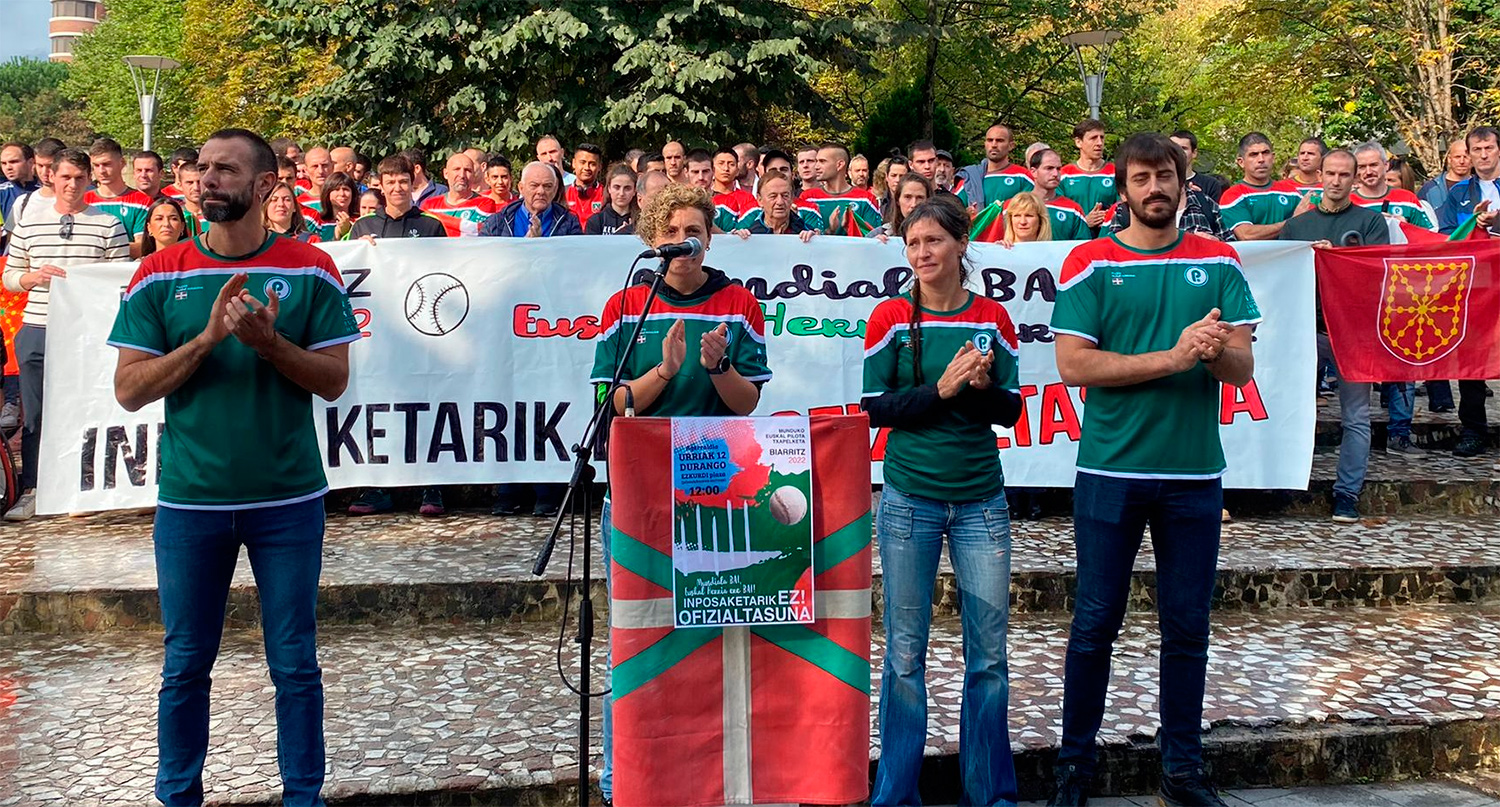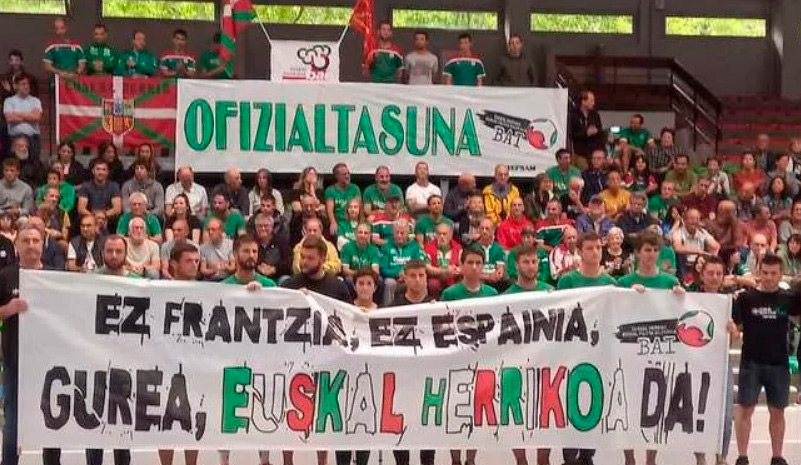"At our time, the pelotari was sure he hadn't retired."
- There was once a pelotaris, players of the spike basket and racket, who dreamed of America. They were the ones who carried out the dream, like Juan Ignacio Zulaika, who in the US tasted it both from the vinegar of the nightmare and from the joy of sleep. Count on the blog Txik-txak...
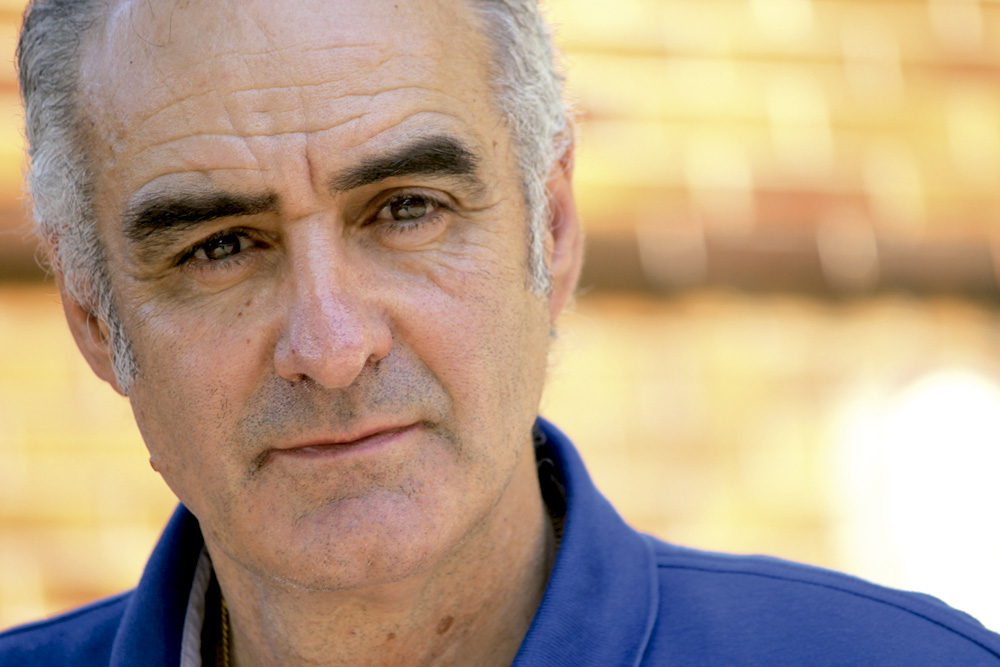
Tolosan hazi zen, baina 14 urte besterik ez. Pilotari ari zen Zaragozan 15 urte zituenean. Harrezkero, Milan, Bartzelona eta Floridako frontoiak zapaldu zituen, Amerikako ametsa betez. Pilotariek 1988an AEBetan hasi zuten grebak zapuztu zuen ametsa. Urtea eta zenbait hilabete borrokan eman eta gero, Euskal Herrira itzuli zen 1989an, ezkondua eta haurra zutela ordurako, bestelako bizimodu bat amets, bestelako lanbide bat. Garraio enpresa batean hasi zen lanean eta, bestalde, Amerikan pilotari da haurra zela Euskal Herrira etorritako hura.
The fans of the tipping cart were not only in Gernika and Markina, but also in Markina.
Don't even think about it. In Gipuzkoa there was a great hobby of the spike basket. In the area of Villabona, in the region of Oarsoaldea… In Bizkaia the greatest focus was Markina, from where most of the pelotaris left, but we also left hundreds of the school of Tolosa.
You went to live in Tolosa at the age of 6.
I was playing the ball when I was eight. Aita pelotazalea, and we lived near the pediment. My older brother and I were watching the other Pelotaris play. One day, my father brought us a basket, and in Anoeta (Tolosaldea), we started doing the sessions on the open pediment. Then his father spoke to Rafael Elizondo, who for many years had played ball in many places – Cuba, Manila, Mexico… – and when the teacher retired from the Tolosa ballschool.
And Elizondo welcomed you to the school. But I wouldn't have taken them all.
Get everybody, no. I wanted guys. He was barely able to serve a 17-18-year-old boy, strong and strong. I guess you can't teach the technique. When those patanes went with their father, Rafael (Elizondo) tested them, saw that they were clumsy, and told the boy's father that it was a little late to teach them anything, and there they went home with their head.
It was not their case.
No, we started very young, without strength. Ideal for learning. And we learned, and we went pelotaris. I, for example, debuted at 14 years old, in Zaragoza (Spain). It was enough for debuting. She had also debuted at 13 years old, boys still walking in shorts. And they went to both Cuba and Madrid. It was also terrible for us to leave the house. Ours was a very small world, a school and a family, nothing else. It was Franco, we did not know about the situation, and on the other hand, we live very conditioned by religion, with shame and guilt: not even sexual information, not relationship with the girls, in school we were the boys with the boys, the girls with the girls… That had a lot of weight in our education.
In exile, it wasn't.
So, it's a joke. For one thing, we had an amazing dream and an amazing dream to go to America. On the other hand, we had a lot of shame and fear, we lived completely united in every way.
America dream you.
When we were studying in Tolosa, Tximela and Pelotaris of great renown came, and we looked at them with the same admiration that today the boys look at the football players. “This has come from America. From the Philippines. The other from Madrid. Thus, from Mexico.” We didn't know exile, but in our head, the imagination was free. I remember that in Miami they published a sort of leaflet, pictures of pelotaris, quinielas… for us it was amazing, although we didn’t understand it: English names for us rare, Cuban pelotaris to ball with basques…

On one occasion you joined that world.
Yes. At that time, the pelotaris played in America for four to five months. Then they came to Euskal Herria and played in Spain in Zaragoza, Madrid, Mallorca… They were older than us, they came, went and we lived waiting for our turn to go to America. One day we were told that the fronton businessman from Miami was coming and I learned that he had come to see me, among other things me. I played, but I was nervous. Then the intendant called me to the office, and there, the American businessman told me, half in English, half in Spanish, that I was a young man, that I had to wait until I arrived, that I would have a place. As for me, in my fantasy as a child I believed that on the same day I would have a contract and, damn it!, I had let myself down. I was immediately able to go to Milan, with several veterans. “He’s young but mature.” I had to ask my father for permission. The other one accepted and went to Milan. There I turned 15. It was a terrible leap. Zaragoza was but a great town. Milan was a totally different city. The atmosphere, the language, the culture, the cinema, the political environment… I was very comfortable, even though this feeling of shame and guilt conditioned me.
Were you alone?
With young kids like me. I went with a beasaindarra. There we met with a Biscayan in the house and lived in the way of the students. From house to pediment. The spectators of the fronton were bad, they didn't swear, but they made a lot of noise and they entered terribly with the pelotaris. They didn't forgive there, even though they were 14 years old. On the other hand, the world appeared. I learned Italian, reading a little, going to the movies…
He has a career of puntionists, always dreaming of America.
But to go there it was easier to make the road to the fronton of Barcelona than that of Milan, and I went to Catalonia. I did a year and a half.
From your way, you went from Barcelona to America.
I was offered a contract to go to Florida, Tampa City, in 1973. However, we started the season on January 1, 1974. We were about 45 adults, young people looking at themselves. I met with my fellow string, as usual, Lujanbio de Hernani, Sebastian Arruabarrena de Astigarraga, Alkorta de Mutriku…
And what was America?
What a discovery! The landscape, the climate, the pediment – full to the neck every day – the girls everywhere, the pelotaris have seen us well… It was a very nice time. Among us there was a lot of competition; in Tampa, on our fronton, a bit quiet mourning, but in the wild Miami. Our city was also quieter than that of Miami, many Latinos here, also those of Cuba… In Tampa, most were Americans. There, I also studied the language, and I also started studying in college, not knowing what I was doing.
Also studying at the university?
Yes. Ja, ja… I’ve always had a tendency to sociology, anthropology…
They weren't many like you.
No, not at that time. Today, yes, there are people who study in college. They realize that after the ball there's life. At our time it was different, the pelotari was safe until the time of withdrawal, as we saw. I, 20 years old and with something I started studying, but without a hurry. I saw myself playing at the age of 40. On the other hand, I lived looking at the Basque Country, the Transition was also there. If I hadn't been there, I don't know where I could have ended up here. I remember there was a magazine, Triumph, of the Communist Party, and good articles by Eduardo Haro Tecglen. I also received the light from the sky.

Celeste too.
Yes. I lived in Florida, but I looked at the Basque Country. But here and there. He played in Tampa and Ocalan, and spent two months in Euskal Herria. Then I was offered to go to the pediment of Bridgeport, where it was a five- or six-month season, and where the summer festivals were. My thought was within me and I arrived. And I met the one my wife was going to have, and we got married and came to Bridgeport. But I had already gotten my nose into this.
A famous strike came in.
In 1988, we went on strike. The first thing that was done was to ask for money. In order to do so, it was decided to create the players union Jai-ALAI [player puntionists]. In addition, the spark was formed in the pediment where I was playing. He called us Pedro Olarreta from Gernika, he meant something to us. A pamphlet told us that if the company did not want to double the salary, it would start a hunger strike. We didn't take much notice of him, but when the mayor learned about Olarreta, he fired him. However, Olarreta's concern was received by some and the union was established. They took a lawyer and they kept walking. I think it was a bit moderate. Later, however, the extreme elements took control of this process, and the attitude of the company itself hardened.
The thing broke out.
Very tough companies and tough players. "We have to give firewood here! ", some said, and it formed. A hot Basque wrestler came out of our interior, and the great drunk! About 600 pelotaris on strike, about fourteen closed fronts in Florida and Connecticut. Companies then began to contract shackles, some Americans, others among us. And a few lows were accomplished, and the fronts began to open backwards. Few people got together on the front lines, wagering is also ridiculous, but entrepreneurs expect to break the movement. We in the pickets, circling the fronts, as in the movies.
There are also photos.
Everything we thought was going to be fixed right away became a bit crooked. The situation continued through the courts. “Be quiet guys, everyone will have to take us back, and you will also receive the money back,” they told us. But it took a long time to decide. “I don’t see the future, I’m going to Euskal Herria,” I said and came.
What do you say about that hard and long strike?
It's a very complex, very complex issue, because there are different readings and versions. There was a time when leadership was also, the obstinacy of the Basques… According to conception, our behavior was heroic, or quixotic. This passion for struggle was terrible. But I've already told you that I finally made my decision and came. I also played some games here, but only a few. No illusion, no doubt to continue playing in the highest category, and in 1992 I left it. I was 36 years old and, in the meantime, since the strike began, I had been away from home for two years.
So he ended his happy party in America, and almost the party joy as well.
Yes. Some pelotaris came, although most stayed there, because they had lived there. My brother, for example -- In the end, the judges gave our union reason, forced the businessmen to readmit the players, but the pediment wasn't the first. During the strike, on the other hand, all kinds of games, lotteries and betting have spread, and the fronts have ended. They closed one after the other.
The documentary Jai Alai Blues, in part, tells the same thing.
Yes, yes. Today they are two frontons, one semi-finished. Moreover, the fronts remain open for legal imperative, because if you want to keep the betting permit, these two fronts are forced to offer them joyfully. He's not going to see anyone, but the fronts are forced to organize parties. Now it's about 70 pelotaris going to be there. More of those here work by hand, which is 48 here. However, they don't make much noise. Ja, ja…
“Gogoratzen naiz Hartford eta Bridgeport-eko pilotariak bilerak egiten hasi ginenean, han azaldu zela behin, Egurbide. Intendente ari zen beste frontoi batean, baina denboraldia hasi gabe zegoen. Hartu ninduen eta galdetu zidan: ‘Hi, uste duk grebara joko duzuela?’, eta nik: ‘Ezta pentsatu ere! Bilerak egiten ari gara, patxadaz, elkartea sortu…’. Horixe pentsatzen nuen. Baina handik hiru astera kale gorrian ginen denok!”.
“Amerikan paradisuan bizi ginen eta, aldiz, uste genuen hura infernua zela. Beti protesta jotzen ari ginen. Frontoiak lepo betetzen ziren, enpresaburuek diru asko irabazten zuten, zegokiguna baino gutxiago irabazten genuen, seguru asko. Lanean beti dago protesta jotzeko arrazoirik. Gure kasuan, ez genuen asmatu egoera kudeatzen, ez genuen gerririk izan. Muturreko jarrerak hartu genituen: ‘Egurra, latz!’, esaten genuen”.
“Gure frontoiaren itzalean, pilotari amateurren mundua sortu zen, eta guk haiei saltzen genizkien erabilitako xextoak. Guk grebara
jo genuenean, eskirol joateko aukera izan zutenean, gure frontoira zuzen, guk saldutako xextoak hartuta! Kar, kar… Mutrikuar batek esaten zuena: ‘Zer uste zenuten, bada, zertarako nahi zituztela gazte hauek?’”.
Ezohiko pilotaria da Juan Ignazio Zulaika. Betikoa du aitagandik jasotako irakurtzeko zaletasuna. Maximo Gorki, Honorato Balzac, Pio Baroja… irakurri zituen gazterik etxean. Italian pilotari ari zela, berriz, Henri Charriere-ren Papillon, Mario Puzzoren Aitaordea… eta beste hainbat. Lehen, irakurri. Orain, irakurri eta idatzi egiten du, txik-txak, zesta jokalariaren jokaldian.
Irungo Landetxa auzoko pala txapelketa mistoan, hogei bikotetik bakarra da emakumeek osatua, 40 lagunetik bi baino ez dira emakumeak: Idoia Karrera eta Loiola Zuazu. Lehiaz, txapelketa misto eta ez mistoen arteko aldeez eta joko-mailaz mintzatu gara haiekin. "Emakumeok... [+]
Lehengai anitzekin papera egitea dute urteroko erronka Tolosako Lanbide Heziketako Ikastetxe Integratuko kimika industrialeko ikasleek: platano azalekin, orburuekin, lastoarekin, iratzearekin nahiz bakero zaharrekin egin dituzte probak azken urteotan. Aurtengoan, pilota... [+]
The achievement of the Euskadi Selection has undoubtedly been a historic achievement. But if you stick to that, for many Basques – I too, because I am Navarro – it will be the darkest and saddest day. After enjoying the joy and warmth of the first few days, let's go back to... [+]
After so many years of struggle for it, 34 years, precisely, we are very pleased with the decision taken a few days ago, on 28 December, Innocent Day, in Pamplona, at the assembly organized by the International Federation of Basque Ball. Well, from now on we will have the... [+]
I had bought it for some time and read it above, but I have only recently been able to attend with the attention I wanted to the book Joxemari Iriondo Pilota eta Bertsoak. I have found old acquaintances and I have been raised with some of the struggles, lost and winnings that... [+]












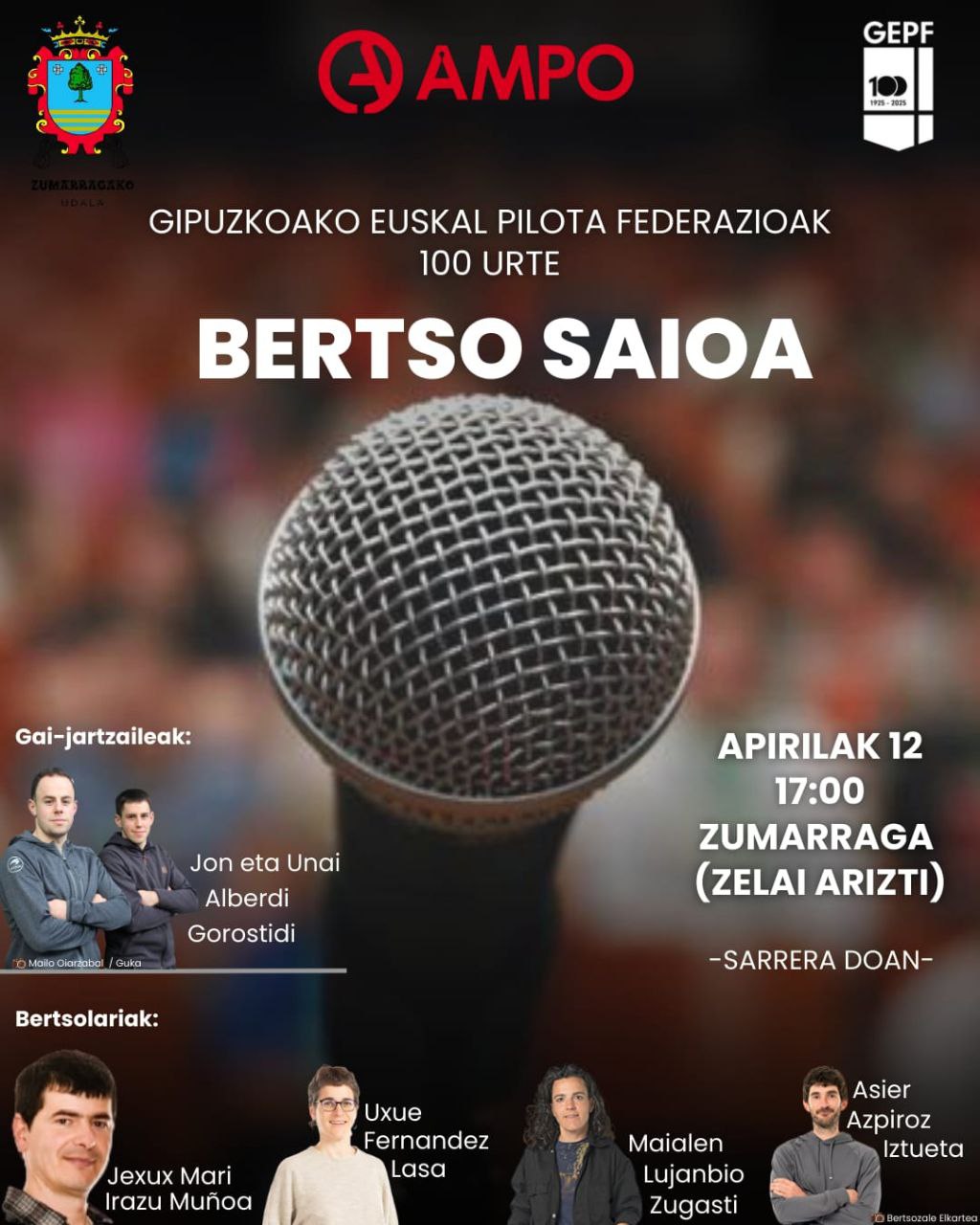

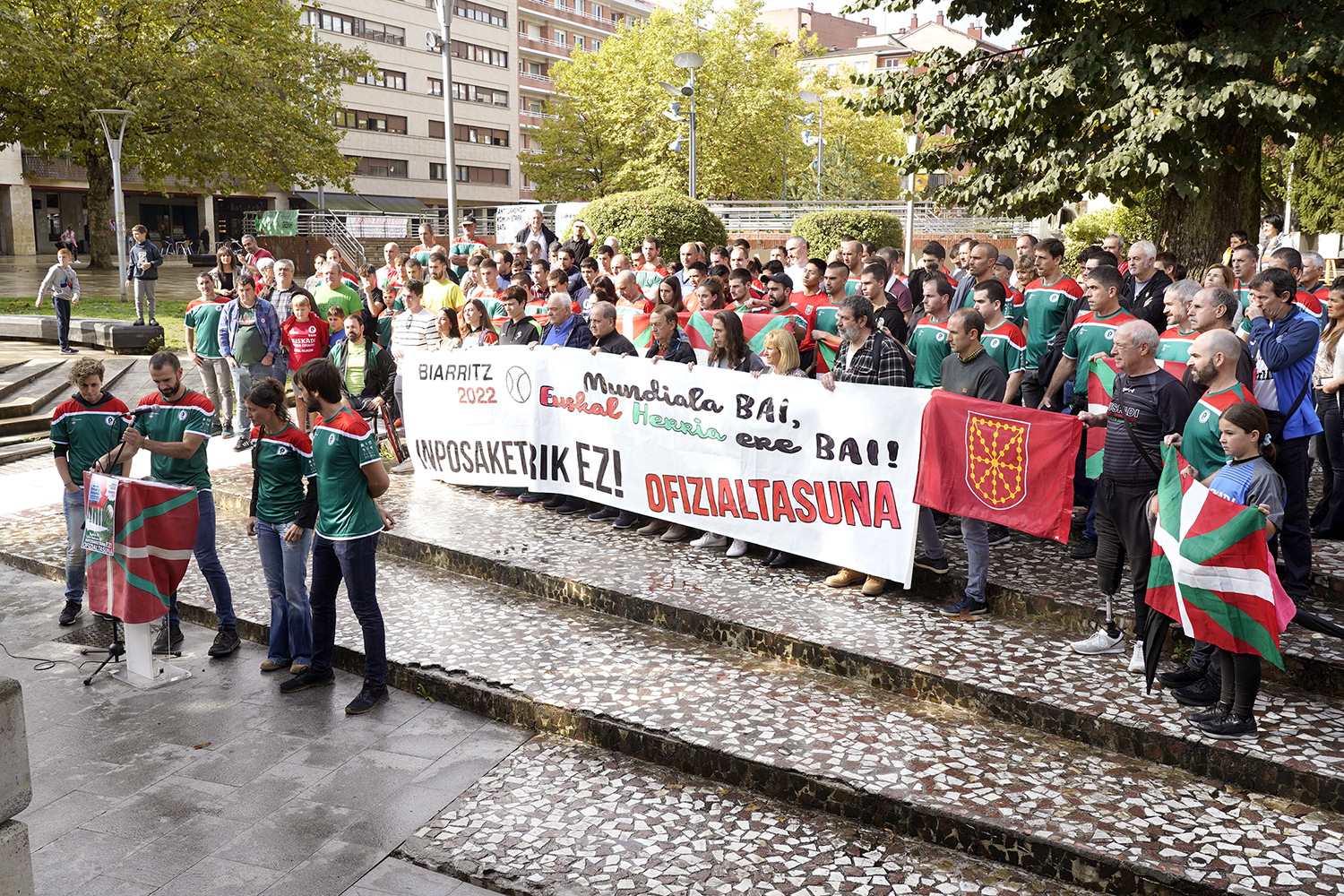
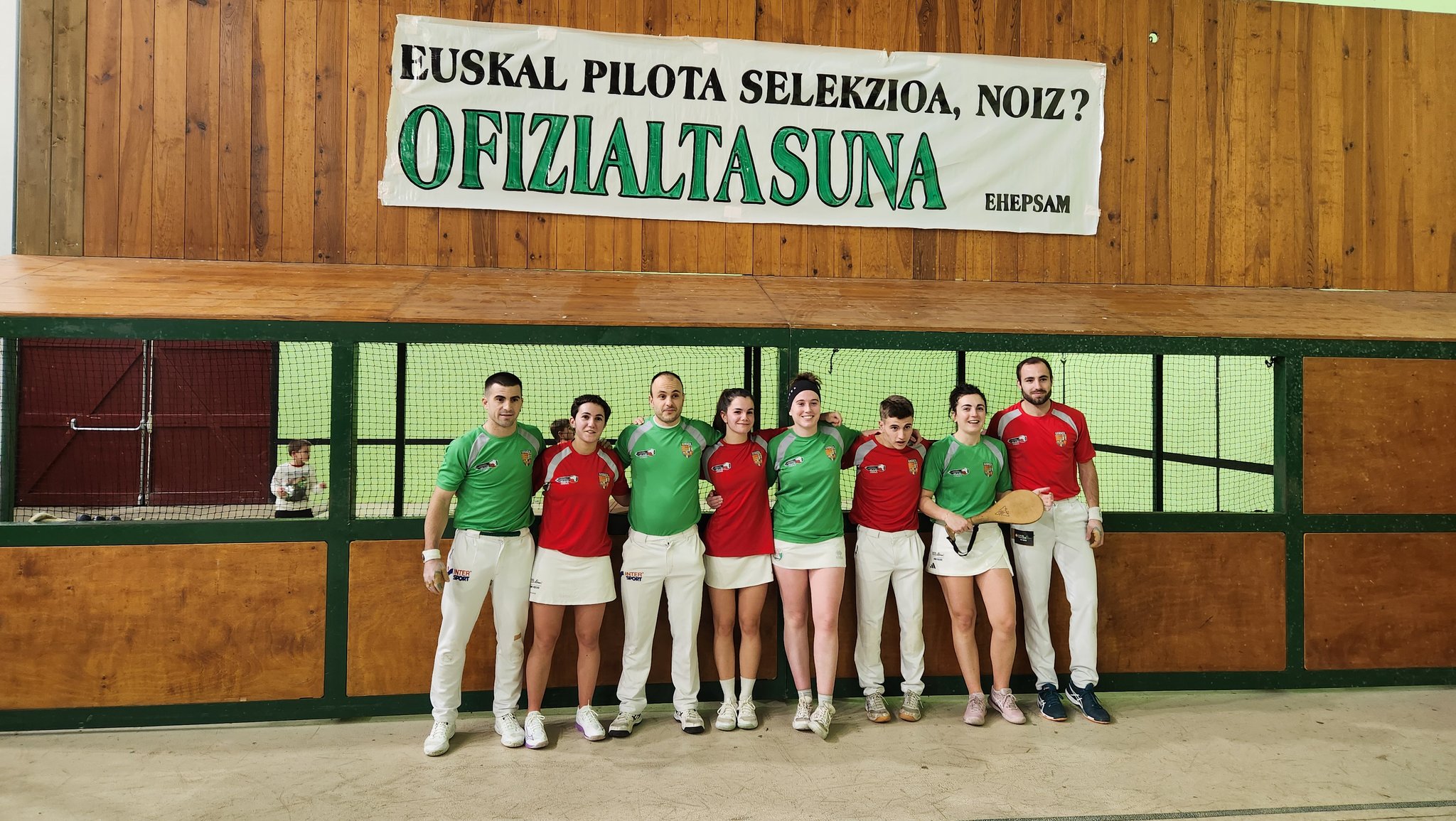
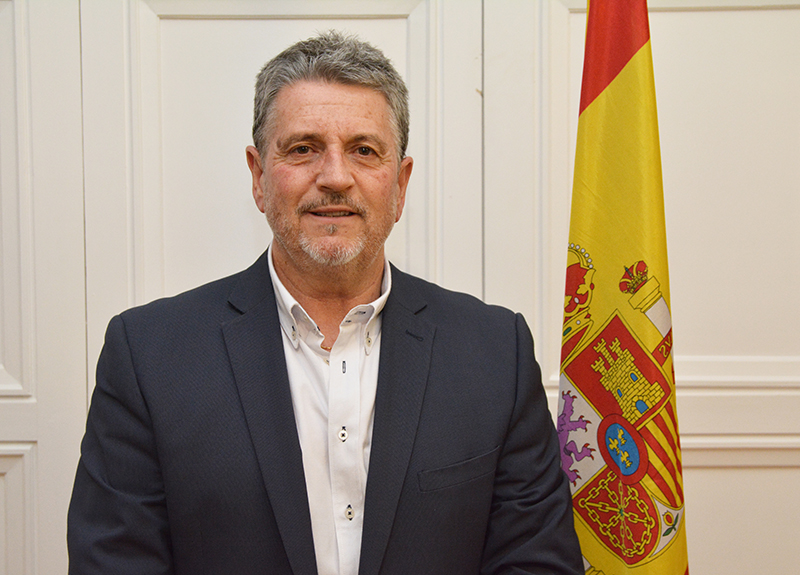
.jpg)
